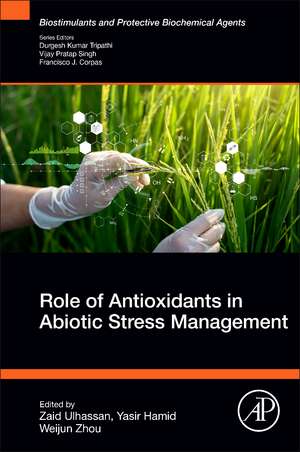Role of Antioxidants in Abiotic Stress Management: Biostimulants and Protective Biochemical Agents
Editat de Zaid Ulhassan, Yasir Hamid, Weijun Zhouen Limba Engleză Paperback – aug 2025
Written by a team of international experts, this book provides an important reference on morphological, physiological, biochemical, metabolic, anatomical and molecular responses of plants under stress factors.
- Provides important insights for improved breeding success
- Highlights management strategies for enzymatic and non-enzymatic antioxidant-mediated stress tolerance in plants
- Includes illustrations to clarify and demonstrate key aspects
Preț: 947.49 lei
Preț vechi: 1041.19 lei
-9% Nou
Puncte Express: 1421
Preț estimativ în valută:
181.30€ • 189.68$ • 150.61£
181.30€ • 189.68$ • 150.61£
Carte nepublicată încă
Doresc să fiu notificat când acest titlu va fi disponibil:
Se trimite...
Preluare comenzi: 021 569.72.76
Specificații
ISBN-13: 9780443141393
ISBN-10: 0443141398
Pagini: 475
Dimensiuni: 152 x 229 mm
Editura: ELSEVIER SCIENCE
Seria Biostimulants and Protective Biochemical Agents
ISBN-10: 0443141398
Pagini: 475
Dimensiuni: 152 x 229 mm
Editura: ELSEVIER SCIENCE
Seria Biostimulants and Protective Biochemical Agents
Cuprins
1. Underlying mechanisms responsible for abiotic stress responses and defense adaptation in plants: Recent advancements and future prospects
Part 1: Role of Enzymatic and Non-Enzymatic Antioxidants
2. Multifaceted roles in plant abiotic stress responses and tolerance mechanisms
3. Protective roles against heavy metals or metalloids stress in plants
4. Involvement against drought stress or water deficiency in plants
5. Mechanisms in waterlogging tolerance in plants
6. Contributions toward salinity stress tolerance in plants
7. Efficacy in cold stress tolerance in plants
8. Addressing heat stress in plants
9. Addressing ultraviolet radiations and weak or strong light stress in plants
10. Combating ozone stress tolerance in plants
11. Addressing nutrient deficiencies or sufficiencies in plants
12. Plant adaptation to hypoxia or anoxia stress conditions
13. Addressing xenobiotics stress in plants
Part 2: Practical Applications of Specific Antioxidants in Abiotic Stress Tolerance
14. Novel green nanoparticles to improve the crops resilience
15. Agronomic management approaches to enhance crop tolerance
16. Plant defense activation via organic and inorganic molecules and biostimulants
17. Activation of antioxidant enzymes utilizing micronutrients and phytohormones or signaling molecules
18. Advanced target and new genome-editing approaches to improve the crops resilience against abiotic stressors
19. Advanced genetic technologies to improve crop abiotic stress resilience
20. Potential of soil or plant growth promotion associated microbes in improving the abiotic-stress resilience of agricultural crops
21. Conventional and Biotechnological metabolic engineering approaches to enhancing of abiotic stress tolerance in plants
22. Molecular underpinning of plants hormonal signaling to abiotic stressors using plant chemical and synthetic biology approaches
Part 1: Role of Enzymatic and Non-Enzymatic Antioxidants
2. Multifaceted roles in plant abiotic stress responses and tolerance mechanisms
3. Protective roles against heavy metals or metalloids stress in plants
4. Involvement against drought stress or water deficiency in plants
5. Mechanisms in waterlogging tolerance in plants
6. Contributions toward salinity stress tolerance in plants
7. Efficacy in cold stress tolerance in plants
8. Addressing heat stress in plants
9. Addressing ultraviolet radiations and weak or strong light stress in plants
10. Combating ozone stress tolerance in plants
11. Addressing nutrient deficiencies or sufficiencies in plants
12. Plant adaptation to hypoxia or anoxia stress conditions
13. Addressing xenobiotics stress in plants
Part 2: Practical Applications of Specific Antioxidants in Abiotic Stress Tolerance
14. Novel green nanoparticles to improve the crops resilience
15. Agronomic management approaches to enhance crop tolerance
16. Plant defense activation via organic and inorganic molecules and biostimulants
17. Activation of antioxidant enzymes utilizing micronutrients and phytohormones or signaling molecules
18. Advanced target and new genome-editing approaches to improve the crops resilience against abiotic stressors
19. Advanced genetic technologies to improve crop abiotic stress resilience
20. Potential of soil or plant growth promotion associated microbes in improving the abiotic-stress resilience of agricultural crops
21. Conventional and Biotechnological metabolic engineering approaches to enhancing of abiotic stress tolerance in plants
22. Molecular underpinning of plants hormonal signaling to abiotic stressors using plant chemical and synthetic biology approaches


